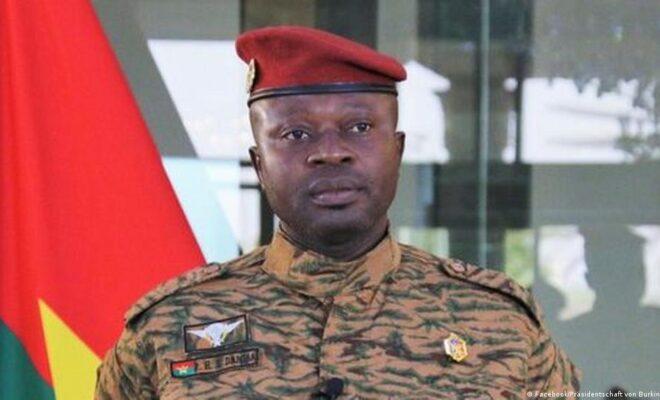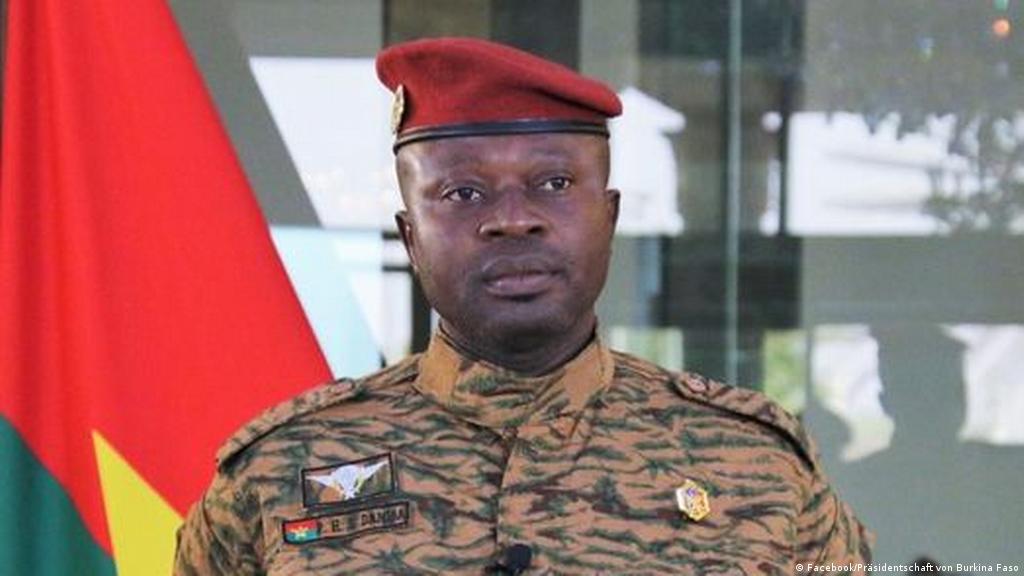Making sense of the coup in Burkina Faso

The latest coup in the Sahel again points to domestic and international distrust and policy failures.

Lieutenant Colonel Paul-Henri Damiba giving a public address after the coup in Burkina Faso.
Another day, another coup in the Sahel. Within 12 months, Chad, Mali and Burkina Faso have all fallen under the de facto control of the military, as has Guinea on the coast. Democracy seems in retreat. Jihadists appear to be advancing. And destabilised states look increasingly at risk of disintegrating.
From an international perspective, the G5 Sahel (a group including the governments of Burkina Faso, Chad, Mali, Mauritania and Niger), the West African bloc ECOWAS and the African Union (AU) appear ineffective in responding to these coups. The UN and European Union (EU) remain present but constrained. France is increasingly unpopular. And Russia is seizing opportunities to win friends by selling security services and weapons.
So what is going on, and how can the international community best help the people of the Sahel?
Four factors at play
There are four factors at play. Firstly, climate change and demographic growth are jointly putting increased pressure on existing resources, including land and government services. Labour is plentiful, but the lack of education and investment mean there are few opportunities. The main options for people outside agriculture are to work in informal goldfields that are springing up across the region or migrate further afield to find work. Migration has always been a seasonal activity in the Sahel with many villagers migrating to local towns and cities in the dry season, but it is increasingly becoming permanent and more distant.
Secondly, the states of the region find it increasingly difficult to provide basic security to their citizens. Swathes of northern and eastern Mali are now effectively ruled by jihadists, with local communities having signed deals to abide by their rules and pay them taxes in return for peace. The same has begun happening in northern Burkina Faso. Local militaries are on the back foot – under-equipped, poorly-led and lacking reliable intelligence – and citizens are increasingly taking security into their own hands. But this undermines the core function of the state. Ultimately, whoever has physical control is effectively the ruler.
Thirdly, this inability to deliver security, work or development to their citizens – often combined with fairly blatant corruption – undermines the political legitimacy of governments however democratically elected. Citizens then become more willing to see if the military can do any better.
Fourthly, there is disillusion with existing international partners whose interventions are seen as either ineffective or unhelpful. The UN has taken heavy casualties and received little thanks for its role in Mali. France has become a particular target for protest in Mali and other countries in the region, as much for its historical role as for its current military campaigns against jihadists. Even ECOWAS is now unpopular in Mali for imposing sanctions against the military government.
Burkina’s uprising and coup
Political stability and accountable government take time to establish. Burkina Faso is a classic case. The current trouble stems back to President Blaise Compaoré. Widely suspected of orchestrating the 1987 coup that killed his radical predecessor Thomas Sankara, Compaoré nevertheless presided over a period of relative stability. He was strongly supported by international donors who poured money into the country, though the proportion of people in poverty only fell from 45% to 40% during his 27 years in power. While keeping the army relatively weak, Compaoré relied on a Presidential Guard and informal links with jihadists and rebels to keep the peace. He held regular elections, which he won by predictably generous margins.
When he sought to change the constitution to prolong his rule, however, he provoked a popular rising in October 2014 that forced his departure. A military government under Colonel Isaac Zida took over. Under pressure from ECOWAS, he organised elections, which a year later brought Roch-Marc Christian Kaboré to power.
Though re-elected in November 2020, Kaboré’s failure to tackle escalating jihadist attacks in the north, which have displaced 1.5 million people, and his inability to get the economy moving again meant the military takeover on 24 January 2022 appears to have been widely welcomed by the public.
The apparent leader of the coup, Lt Col Paul-Henri Damiba, is young but politically well-connected as the son of Béatrice Damiba, the former information minister and a member of the Council of Elders. He has been heavily involved in the fight against jihadism, publishing a book on the subject, and was appointed only weeks before by Kaboré to head the anti-terrorism campaign. Damiba’s disgust at the government’s failure to equip and pay its soldiers adequately may have persuaded him to intervene.
Good and bad coups in the Sahel
It is what happens next that matters. “Good coups” can take place and have done in the Sahel. In February 2010, President Tandja of Niger looked poised to prolong his rule against public wishes. Led by Lt Col Salou Djibo, the military forced him out and put in place a transition that led to the election of President Mahamadou Issoufou in March 2011. Issoufou recently stepped down at the end of his second term and was succeeded by the duly-elected Mohamed Bazoum. Though jihadists continue to pose an ever-present threat, Niger’s government looks both more democratic and stable than its neighbours.
One of those, Chad, has been one of the most effective in the region at keeping jihadists at bay. But the hurried elevation of Idris Déby’s son when the president was unexpectedly assassinated in April 2021 spoke to the elite’s concern for continuity rather than accountability or development. In the medium term, what many refer to as an “institutional coup” could undermine rather than reinforce stability.
The problem with military governments, as we see in Mali, is they find it hard to leave once in power. The lack of institutional accountability encourages corruption, however well-intentioned the leaders. And their track record against jihadists is typically no better than that of elected governments, while their record on human rights is often been worse.
The democracies in ECOWAS, still a majority, worry that military takeovers could prove infectious if tolerated. The problem remains – and no AU early warning systems are effective against this – the failure of governments to deliver on their election promises. President Keita of Mali dismally failed to address the political concerns of the Tuareg in the north who subsequently linked their rebellion to jihadist groups, which have secured much of the north and pressed ever further south.
Complicated foreign involvement
France, which rescued Mali from the last attempt by jihadists to seize the capital Bamako in 2012, is in difficulties. Keen to reduce its expensive security commitment, France and the EU backed the G5 group of Sahel countries to assure their own security. But their capacity is still too limited, and the AU is not in a position to provide the kind of peacekeeping support it has sent to Somalia. This was touted in 2013, but no African states were willing to commit, so the job in Mali fell to the UN. France does have a vital interest in Niger’s uranium mines, and is keen to preserve a profile in the region. But the historical baggage of “Françafrique” policies leaves them vulnerable to public hostility.
Russia meanwhile is making Mali’s military rulers a tempting offer: security personnel from the Russian paramilitary Wagner Group to assure their own safety and new arms on easy terms, all without any of the conditionality on democracy and accountability that accompanies EU or US assistance. After the serial failures of Wagner Group mercenaries to defeat rebels in Mozambique and the Central Africa Republic, or to resolve the civil war in Libya, there should be no illusions they will improve the fight against jihadism. But they will prop up the military government against opposition from inside or out. And chaos in the region suits Russia’s purpose just as well, if not better, than stability.
From all this, we can conclude four things. Firstly, politics is a rough business, whether democratic or authoritarian. But what is needed to build a stable state is effectiveness in government and accountability to the citizens. Secondly, legitimacy will always depend on providing law and order as well as jobs and trade. One without the other will always fail in the end. Thirdly, flexibility must be allowed to enable each country finds its own path to accountable and efficient government: no prescribed formula will work everywhere. And fourthly, the international community can still help provide security to enable political systems to consolidate, as in Somalia. But without domestically robust government it will prove futile in the long run, as we’ve seen in Afghanistan.
What happens in the Sahel matters to both the rest of Africa and the rest of the world. For foreign governments formulating policy, it is essential to avoid the mistakes of the past and engage with the present. Supporting good governance, civil society and development remains essential; but without security, the support risks being wasted.






